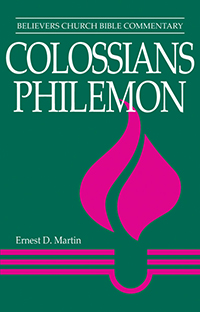Koinonia (in Colossians and Philemon)
![]() Home A B C D E F G H I J K L M N O P Q R S T U V W X Y Z Abbreviations Glossary
Home A B C D E F G H I J K L M N O P Q R S T U V W X Y Z Abbreviations Glossary
Koinonia in the NT
The most used Greek word in the NT for the various expressions of the common life of believers is koinonia*—now also an English loanword. It is translated as fellowship, sharing, community, participation, partnership, contribution, generosity, or communion. This noun is a form of the root adjective koinos, meaning common, shared, or public; in contrast to idios, which means private, individual, concerned only with oneself (the word from which idiocy is derived).
In secular Greek usage, koinonia had several meanings: business partnership, marriage, and relationship with God. The NT speaks of koinonia with God, with Christ, and in (or of) the Spirit. The breadth and depth of meaning show what Christians have in common because they are Christians. The unique phrase the koinonia of the faith (EDM) in Philemon 6 establishes the link between being "called into the fellowship of his Son, Jesus Christ our Lord" (1 Cor. 1:9) and the "fellowship" to which the church was devoted following Pentecost (Acts 2:42). The inseparable relationship between the vertical and horizontal dimensions of koinonia is evident in 1 John 1:3, 6-7. Believers experience the resultant koinonia as a "fellowship of his (Christ's) sufferings" (Phil. 3:10, EDM). Koinonia as community among believers is a creation of the Spirit, as evidenced in the post-Pentecost phenomena described in Acts 2:42-47.
Christian koinonia touches all levels of human existence and experience. "Sharing in the gospel" (Phil. 1:5) includes both experiencing the gospel and helping to spread the good news. Sharing to meet material needs is also called koinonia (Rom. 15:26; 2 Cor. 9:13).
Another form of the word is translated partner, as in Philemon 17. A close bond is implied. The verb form appears in Hebrews 2:14 in parallel with a synonym for koinonia: "Since, therefore, the children share flesh and blood, he (Jesus) himself likewise shared the same things."
Koinonia is akin to bonding. The intensity of the connection can be seen in the warnings about inappropriate fellowship. If a Christian participates in the sins of others (1 Tim. 5:22) and takes part in the shameful works of darkness (Eph. 5:11), that one becomes entangled in the guilt and judgment of those who do such things. The spiritual bond is strong between the Lord and believers, and between believers in the holy community. This bond is of such an exclusive character that Christians cannot have koinonia with unbelievers without compromising their true koinonia (2 Cor. 6:14-18). Koinonia (communion) at the Lord's table precludes idolatry and partaking of the table of demons (1 Cor. 10:16).
The koinonia of the faith is a pivotal factor for Philemon. It should be a basic ingredient in the lives of all who respond to the call to experience Christ and the church
Koinonia in the Church Today
Popular connotations of fellowship often fall far short of what the NT labels koinonia.
Koinonia is more than meeting together from time to time; it is more than merely enjoying the presence of others; it is more than those feelings of wellbeing which warm our hearts when we greet our friends at church functions; it is more than common ethnic, cultural, linguistic, and historical ties (although these may well represent important psychological and sociological values); it is more than the organization of a congregation into a series of subgroups related to interest, age, and sex (such multiplication of activities can become a substitute for true koinonia). (Driver, 1976:29)
Koinonia is first of all an experience of commonality and community before it is something that people do. The reality of the bonding of human and divine in Christ, issues in genuine, tangible human relations that encompass the whole gamut of human existence. Believers are to experience the koinonia of faith in the worship assembly, and also in the social and economic aspects of life. The genius of true koinonia is in the intertwining of the spiritual and material in the sharing of life. It is not enough to confess a "spiritual" kinship with all Christians while failing to cross the social, racial, and economic fences of the prevailing culture in tangible and authentic ways.
Christian koinonia is too serious a matter to be trivialized and reduced into merely having a social good time. Koinonia will continue to be an essential element in church life and an attractive component of the gospel message for those outside of faith and thus outside of true koinonia.
| —Ernest D. Martin |
